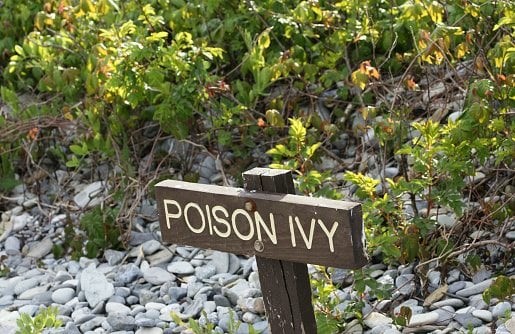
Now is the time of year to head outside and jump on your bike, hike a trail, play a round of golf or put on your gardening gloves. But enjoying nature isn’t always fun. Just ask someone who has gardened all day. Besides having a beautiful yard to show for your efforts, you may have a less pleasant result: a red, itchy rash.
Inflammation of the skin, known as contact dermatitis, is an allergic reaction to the irritating substance urushiol oil. During outdoor activities it is easy to come in direct contact with poisonous vegetation including poison ivy, oak or sumac. Even though you may know what these plants look like and are able to avoid the leaves, berries and roots, contact dermatitis can be also be contracted from dead vines or smoke from burning brush. The potent oil can become airborne.
You can also be exposed when coming in contact with contaminated clothing or tools and petting an animal that may be carrying the oil on its fur. Even days later, it is possible to have an allergic reaction after contact with residual oil.
Contact dermatitis does not discriminate. An estimated 50 percent to 60 percent of people experience an allergic reaction to poisonous plants, according to the National Institute of Health. Your immune system can begin to react within a few hours of exposure or it may be as long as 48 hours before a reaction occurs.
A minor case may result in mild redness and a raised itchy rash while a major reaction may cause large blisters, swelling and intense itching. The skin can develop scaly or raw patches that may ooze, drain or crust. In extreme cases, a person’s eyes can swell shut, his or her airways can be affected, and wounds can become infected. As bad as it can be, it is not contagious even if someone comes in direct contact with your irritation.
https://soundcloud.com/hartford-healthcare/treating-poison-ivy
Of course, protecting against contact is the best course of action. If you know that you have been exposed, flood your skin immediately and thoroughly with cool water and soap. Hot water will only open your pores, allowing the oil to spread. Some people wash the affected skin with alcohol. Any clothing should be discarded or thoroughly washed.
If it’s too late and you’ve developed a reaction, itching and irritation can be eased by cold wet compresses of water. Individuals may find relief if the water is mixed with baking soda or vinegar or by using special washes. Cool baths with water and an oatmeal agent can temporarily provide comfort. Over-the-counter creams and lotions such as calamine can ease the itching. Avoid scrubbing and never pop any blisters.
If the itching intensifies and the rash becomes more inflamed, it may be time to call your physician. Sometimes certain medications may be prescribed.
For information about Hartford HealthCare’s urgent/walk-in care locations, please visit our website here.

